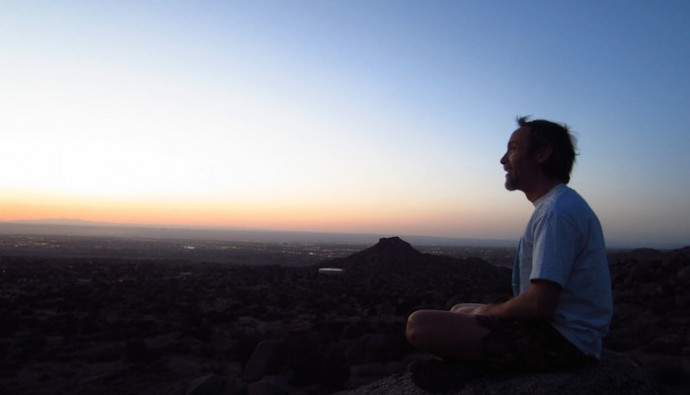Once upon a time I was lost along with 5 other people in the Sahara Desert. At night. With only the headlights of two Toyota pickup trucks to guide us.
It was mildly terrifying, and one of many times in my life when I didn’t know where to turn, not just in a figurative sense, but also literally. I literally didn’t know which sand dune to point the truck towards because there wasn’t a road to follow. Because it was nighttime and, as it turns out, it gets dark really fast in the desert, everything looked the same. Sand and dark. Everywhere.
The Bible recognizes that there are moments like that for all of us. These are the times when you truly do not know what the next step is; when anxiety is closing in; when everywhere seems like darkness that you can’t get through; when you don’t know where to turn.
That’s why the Bible tells us to “look.” Here are five places you can focus your gaze during those times – when you don’t know where to turn:
1. Look to the flowers and birds (Matt. 5:26).
Why does Jesus bring up the flowers and the birds as the point of our gaze? It’s specifically to deal with our anxiety. When we have worries about our physical needs, wondering if God can be trusted with the very basics of human life, we turn our eyes to them. What we see there is that God is a loving Creator, and if He takes care of the flowers and birds, then He will surely take care of us.
2. Look at His hands and feet (Luke 24:39).
Why does Jesus tell us to look to His hands and feet? In its context, He said this to the disciples who doubted that He was truly risen from the dead. He wanted them to see that He was real, more real than any ghost or figment of a frayed imagination, but that He is as real as real can be. When we find ourselves wondering if there is a real God who really cares about our real problems in the real world, we fix our eyes on the redeemed wounds of Jesus which remind us that He does indeed care about real life, for He Himself has experienced the worst of it.
3. Look to the interests of others (Phil. 2:3).
Why does Paul tell us to look to, or consider, the interests of others ahead of our own? It’s first and foremost for the sake of unity in the church. But looking to the interests of others also helps us immensely when we don’t know where to turn because it’s in moments like that when we can disappear down the rabbit hole of self-interest. No one understands; no one sympathizes; no one can help. So the thought pattern goes, and when you add on running and re-running a multitude of scenarios about “what happens next” you can drive yourself insane. But we can break out of that cycle by turning our gaze to the interests of others. When we wonder which way to turn, we can always help someone else find their way.
4. Look at how great a love (1 John 3:1).
Why does John, the disciple Jesus loved, tell us to look again on that great love by which we have been called the children of God? It’s because when we don’t know where to turn, the very core of our identity is shaken. We lose a job, a loved one, a relationship, or whatever that defined us, and it leaves us reeling. It leaves us asking, “Who am I without this thing that is now gone?” And John gives us the answer. No matter what else happens, we look to the love of God and know that we are His child.
5. Look to the end (Revelation).
The word “look” appears some 24 times in my translation of Revelation. In it, we are told to look and see the conquering Christ returning; look and see the realities of heaven; look and see the destruction of evil and the devil.
Look, look, look. Look to the end. When we look to the end, when we fix our eyes on what is not yet and yet what surely will be the everlasting reality of the universe, we can continue on in the meantime. When we don’t know where to turn, we can look to the day when everything sad will come untrue.
True enough, there are days (many of them, in fact) when we don’t know where to turn. But in this, too, the Bible helps us fix our eyes in the right place, finding there the God who has already fixed His own gaze on us because of the gospel.
Subscribe to MichaelKelley.co
Never miss a new post. Subscribe to receive these posts in your inbox and to receive information about new discipleship resources.





So good! Thanks for this.